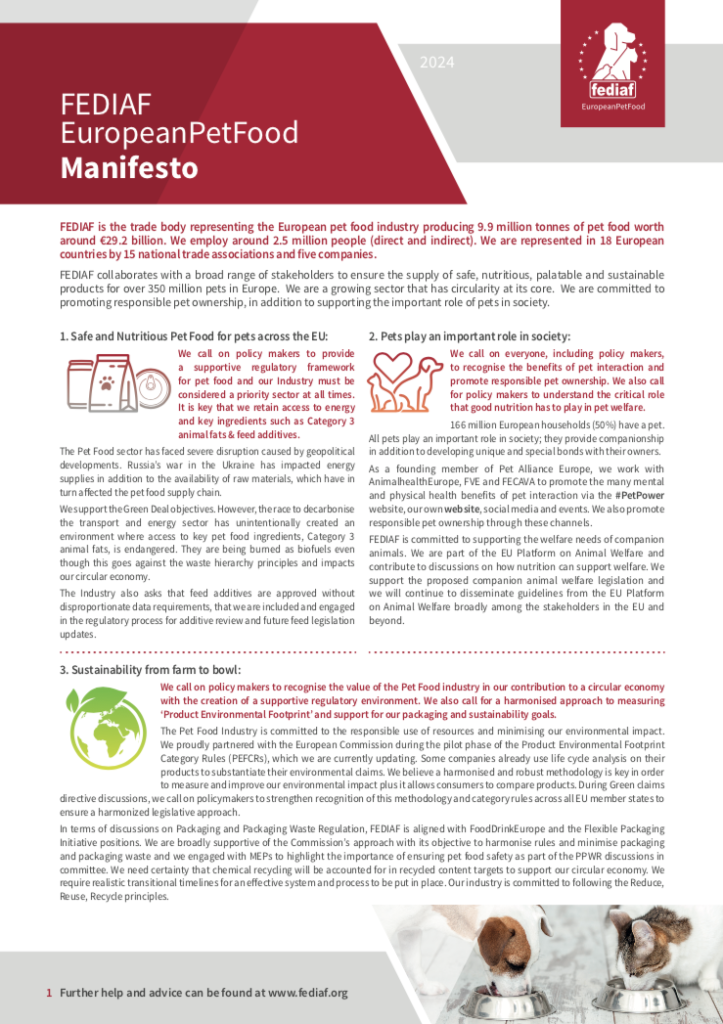FEDIAF represents 18 countries and approximately 95% of the pet food market. We therefore play a crucial role in feeding Europe’s 352 million pets. Our Manifesto advocates for essential considerations from policymakers:
1. Safe and Nutritious Pet Food for pets across the EU:
We call on policy makers to provide a supportive regulatory framework for pet food and our Industry must be considered a priority sector at all times. It is key that we retain access to energy and key ingredients such as Category 3 animal fats & feed additives.
The Pet Food sector has faced severe disruption caused by geopolitical developments. Russia’s war in the Ukraine has impacted energy supplies in addition to the availability of raw materials, which have in turn affected the pet food supply chain.
We support the Green Deal objectives. However, the race to decarbonise the transport and energy sector has unintentionally created an environment where access to key pet food ingredients, Category 3 animal fats, is endangered. They are being burned as biofuels even though this goes against the waste hierarchy principles and impacts our circular economy.
The Industry also asks that feed additives are approved without disproportionate data requirements, that we are included and engaged in the regulatory process for additive review and future feed legislation updates.
2. Pets play an important role in society:
We call on everyone, including policy makers, to recognise the benefits of pet interaction and promote responsible pet ownership. We also call for policy makers to understand the critical role that good nutrition has to play in pet welfare.
166 million European households (50%) have a pet. All pets play an important role in society; they provide companionship
in addition to developing unique and special bonds with their owners.
As a founding member of Pet Alliance Europe, we work with AnimalhealthEurope, FVE and FECAVA to promote the many mental and physical health benefits of pet interaction via the #PetPower website, our own website, social media and events. We also promote responsible pet ownership through these channels.
FEDIAF is committed to supporting the welfare needs of companion animals. We are part of the EU Platform on Animal Welfare and contribute to discussions on how nutrition can support welfare. We support the proposed companion animal welfare legislation and we will continue to disseminate guidelines from the EU Platform on Animal Welfare broadly among the stakeholders in the EU and beyond.
3. Sustainability from farm to bowl:
We call on policy makers to recognise the value of the Pet Food industry in our contribution to a circular economy with the creation of a supportive regulatory environment. We also call for a harmonised approach to measuring ‘Product Environmental Footprint’ and support for our packaging and sustainability goals.
The Pet Food Industry is committed to the responsible use of resources and minimising our environmental impact. We proudly partnered with the European Commission during the pilot phase of the Product Environmental Footprint Category Rules (PEFCRs), which we are currently updating. Some companies already use life cycle analysis on their products to substantiate their environmental claims. We believe a harmonised and robust methodology is key in order to measure and improve our environmental impact plus it allows consumers to compare products. During Green claims
directive discussions, we call on policymakers to strengthen recognition of this methodology and category rules across all EU member states to ensure a harmonized legislative approach.
In terms of discussions on Packaging and Packaging Waste Regulation, FEDIAF is aligned with FoodDrinkEurope and the Flexible Packaging Initiative positions. We are broadly supportive of the Commission’s approach with its objective to harmonise rules and minimise packaging and packaging waste and we engaged with MEPs to highlight the importance of ensuring petfood safety as part of the PPWR discussions in committee. We need certainty that chemical recycling will be accounted for in recycled content targets to support our circular economy. We require realistic transitional timelines for an effective system and process to be put in place. Our industry is committed to following the Reduce, Reuse, Recycle principles.
